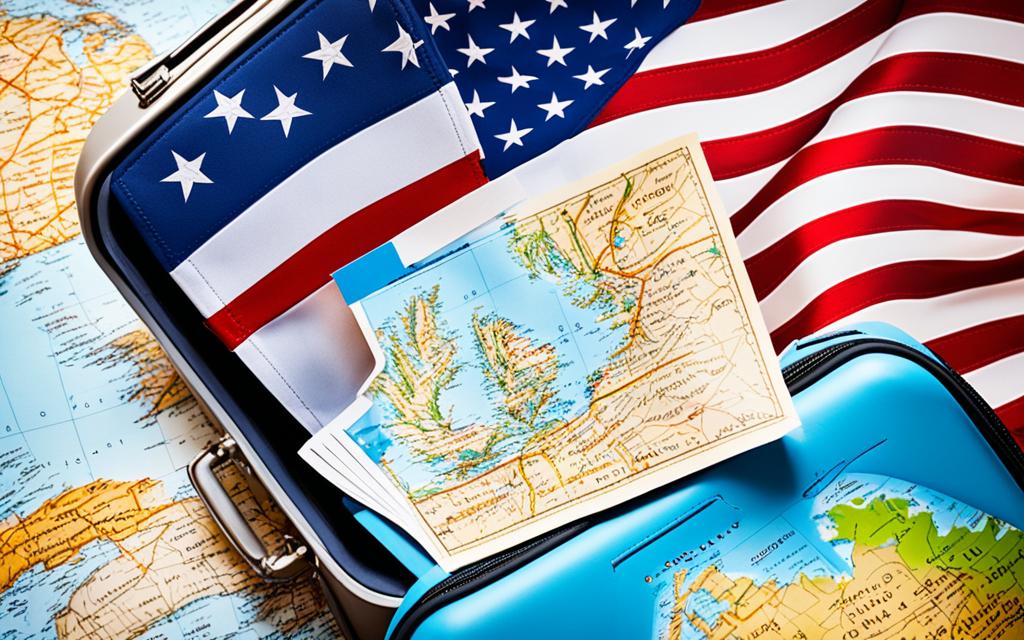Did you know that the travel and tourism industry in the USA is estimated to contribute over $1.6 trillion to the country’s Gross Domestic Product (GDP)? This staggering statistic highlights the immense opportunities that await those who embark on the journey of starting a travel business in the USA.
Whether you have a passion for creating unforgettable travel experiences or dream of turning your expertise into a profitable venture, this ultimate guide will equip you with the knowledge and insights to navigate the complex landscape of the travel industry in the USA.
Key Takeaways
- Starting a travel business in the USA offers lucrative opportunities in a multi-trillion-dollar industry.
- Understanding the dynamics of the travel industry and identifying your niche and target audience are crucial steps.
- A well-crafted business plan is essential for attracting investors and staying focused on your goals.
- Navigating the legal and licensing requirements is necessary to ensure compliance and legitimacy.
- Building strategic partnerships and developing a strong online presence are vital for success in the digital age.
Understanding the Travel Industry in the USA
Before delving into the process of starting a travel business, it is crucial to understand the dynamics of the travel industry in the USA. By gaining insights into the current market trends, key players, and potential opportunities, entrepreneurs can make informed decisions and position themselves for success in this thriving sector.
The travel industry in the USA is a vibrant and ever-evolving landscape. It encompasses a wide range of businesses, including travel agencies, tour operators, airlines, accommodation providers, and online travel platforms. With millions of tourists visiting the USA each year and domestic travel on the rise, the industry offers immense potential for entrepreneurs.
One of the key factors driving the growth of the travel industry in the USA is the increasing desire for unique travel experiences. Travelers are seeking personalized itineraries, immersive activities, and authentic connections with local culture. This trend opens up opportunities for niche travel businesses that cater to specific interests or demographics.
Another significant trend shaping the travel industry is the rise of online booking platforms and digital transformation. With the convenience of online booking and the prevalence of smartphones, travelers have become accustomed to researching, comparing, and booking travel services online. Therefore, having a strong online presence and a user-friendly website is essential for travel businesses to reach their target audience and stay competitive.
When it comes to key players in the travel industry, established companies like Expedia, TripAdvisor, and Booking.com dominate the online travel space. However, there are also many smaller, local businesses that cater to specific destinations or travel niches. Collaborating with these key players and forging strategic partnerships can help entrepreneurs gain exposure and access a wider customer base.
The Current State of the Travel Industry in the USA
It’s important to stay up-to-date with the latest market trends and industry developments to make informed business decisions. Here are some key insights into the current state of the travel industry in the USA:
- The USA is one of the world’s leading travel destinations, attracting tourists from all over the globe.
- Domestic tourism plays a significant role in the industry, with Americans exploring their own country and contributing to local economies.
- Technological advancements have revolutionized the way people plan and book their travel, leading to increased competition and the need for innovative solutions.
- Environmental sustainability and responsible travel are growing concerns among travelers, creating opportunities for businesses that prioritize eco-friendly practices.
- The COVID-19 pandemic has significantly impacted the travel industry, leading to travel restrictions, changes in consumer behavior, and a greater emphasis on health and safety measures.
Understanding the current landscape of the travel industry in the USA is essential for aspiring entrepreneurs looking to enter the market or existing businesses aiming to innovate and stay ahead of the competition. By leveraging market insights and identifying untapped opportunities, you can position your travel business for long-term success.
| Key Statistics | Year |
|---|---|
| Number of international tourist arrivals in the USA | 2019 |
| Percentage of Americans who prioritize unique travel experiences | 2021 |
| Total revenue of the online travel booking industry in the USA | 2020 |
| Percentage of travelers who consider sustainability when choosing accommodation | 2021 |
| Impact of COVID-19 on the travel industry in terms of revenue loss | 2020 |
Identifying Your Niche and Target Audience
To stand out in the competitive travel industry, it’s essential to identify a niche and target audience for your business. By focusing on a specific travel business niche, you can differentiate yourself from the competition and attract customers who are looking for specialized experiences. Additionally, understanding your target audience’s preferences and needs will allow you to tailor your services to meet their expectations. Here’s a step-by-step approach to defining your travel business niche and identifying your target audience:
Conduct Market Research
Start by researching the current trends and demands in the travel industry. Use tools like industry reports, online surveys, and social media analytics to gather data on popular destinations, emerging travel interests, and customer preferences. This research will help you identify gaps in the market and potential niches that you can capitalize on.
Analyze Customer Preferences
Take the time to understand your potential customers. Analyze their demographics, behavior patterns, and travel preferences. Look for common characteristics among your target audience, such as age group, income level, and travel style. This information will guide you in tailoring your services and marketing messages to appeal to your target audience.
Select a Niche
Based on your market research and customer analysis, choose a niche for your travel business. This could be a specific type of travel experience, such as adventure travel, luxury travel, or eco-tourism. Alternatively, you could focus on a particular target market, such as family travelers, solo travelers, or business travelers. Select a niche that aligns with your passion and expertise, ensuring that you can provide unique value to your target audience.
Once you have identified your travel business niche and target audience, you can develop tailored marketing strategies, curate specialized travel packages, and provide exceptional customer service to differentiate yourself in the market. Remember, understanding your niche and target audience is the foundation for building a successful travel business.
Creating a Solid Business Plan
A well-crafted business plan is essential for the success of your travel business. It serves as a roadmap, guiding you through the process of launching and growing your venture. A comprehensive business plan not only attracts investors but also helps you stay focused on your goals and make informed decisions.
When creating your travel business plan, consider including the following key components:
Market Analysis
Market analysis is a critical component of your business plan. It involves researching your target audience, identifying market trends, and evaluating competitors. By understanding the needs and preferences of your potential customers, you can tailor your travel business to offer unique and compelling experiences.
Financial Projections
Include financial projections in your business plan to demonstrate the revenue potential of your travel business. This helps investors understand the profitability of your venture and provides a basis for financial decision-making. Consider factors such as startup costs, pricing strategies, and anticipated expenses.
Marketing Strategies
Outline your marketing strategies in the business plan to attract customers and promote your travel business effectively. Consider digital marketing channels such as social media, content marketing, and email campaigns. Highlight your unique selling proposition and how you plan to position your business in the market.
Operational Plan
Your operational plan outlines the day-to-day operations of your travel business. Include details on staffing, supplier management, booking systems, and customer support. This section demonstrates that you have a clear understanding of how your business will function.
Remember, your business plan should be a living document that you can update as your travel business evolves. It should be clear, concise, and showcase your passion and expertise in the travel industry.
Legal Considerations and Licensing
Starting a travel business in the United Kingdom involves navigating various legal requirements and obtaining the necessary licenses. It’s important to ensure that your business operates within the legal framework and complies with industry regulations. This section will outline the key legal considerations you need to keep in mind when establishing your travel business.
Registering your Business
One of the first steps in setting up your travel business is registering it with the appropriate authorities. In the UK, you need to register your business with Companies House if you plan to operate as a limited company. This registration process establishes your business as a separate legal entity and provides you with certain protections under the law.
Acquiring Necessary Permits
Depending on the nature of your travel business, you may need to obtain specific permits or licenses to operate legally. For example, if you plan to offer guided tours or activities that involve outdoor pursuits, you may need permits from the relevant local authorities or national parks. It’s important to research and understand any permits or licenses that are required for your particular business activities.
Adhering to Industry Regulations
The travel industry in the UK is regulated by various bodies, including the Civil Aviation Authority (CAA) and the Association of British Travel Agents (ABTA). These organizations have specific requirements and regulations that travel businesses must adhere to in order to ensure consumer protection and maintain industry standards. It’s important to familiarize yourself with these regulations and take necessary steps to comply with them.
For example, if you plan to sell package holidays, you may need to comply with the Package Travel Regulations which provide protection to consumers booking package holidays. Similarly, if you plan to offer flights as part of your travel services, you may need to obtain an Air Travel Organizer’s License (ATOL) from the CAA.
By understanding and complying with the legal requirements and regulations, you can operate your travel business in a transparent and legally compliant manner. This not only protects your business but also instills confidence in your customers, helping you build a strong reputation in the travel industry.
Building Partnerships and Supplier Relations
Collaborations with suppliers and partners are essential for offering a diverse range of travel services. By establishing strong travel industry partnerships and nurturing supplier relations, you can ensure a seamless supply chain and enhance the overall travel experience for your customers.
One effective way to build travel industry partnerships is by attending travel industry trade shows and conferences. These events provide valuable networking opportunities where you can connect with potential partners and suppliers. Be proactive in seeking out businesses that align with your niche and target audience. Whether it’s accommodation providers, tour operators, or transportation companies, forging these strategic alliances can give your travel business a competitive edge.
Negotiating agreements with partners and suppliers is a vital aspect of building successful relationships. Take the time to understand each party’s needs and objectives, and work towards mutually beneficial terms. Open communication, transparency, and fairness are key in establishing trust and long-term partnerships.
When sourcing suppliers for your travel business, reliability is of utmost importance. Conduct thorough research to ensure they have a solid reputation, offer quality products or services, and have the necessary certifications and licenses. This is especially crucial in industries like aviation and accommodation, where safety and customer satisfaction are paramount.
Another key aspect of supplier relations is fostering open and transparent communication channels. Regularly review and evaluate your suppliers’ performance to identify areas for improvement or potential risks. Building strong relationships with your suppliers can lead to better negotiation terms, priority access to inventory, and enhanced customer service.
To illustrate the importance of building partnerships and supplier relations, consider the following:
| Partner/Supplier | Benefits of Partnership/Relation |
|---|---|
| Hotel Chain A | Exclusive discounted rates for your customers |
| Tour Operator B | Access to unique and off-the-beaten-path experiences |
| Transportation Company C | Priority booking and reliable transportation services |
By forming strategic partnerships and maintaining strong supplier relations, your travel business can offer a wider range of services, seize new opportunities, and deliver exceptional experiences to your customers.
Developing a Strong Online Presence
In today’s digital age, having a robust online presence is essential for any travel business. With the majority of customers researching and booking their travel arrangements online, establishing credibility and visibility on the internet is vital.
Here are some key areas to focus on when developing your travel business’s online presence:
1. Website Development
A well-designed and user-friendly website is your digital storefront. It should showcase your services, provide relevant information to potential customers, and make it easy for them to book their travel arrangements. Make sure your website is optimized for mobile devices and loads quickly to enhance the user experience.
2. Search Engine Optimization (SEO)
Optimizing your website for search engines is crucial for attracting organic traffic. Conduct keyword research to identify relevant terms related to your travel business, and incorporate them naturally throughout your website’s content. This will increase your chances of ranking higher in search engine results pages, making it easier for potential customers to find you.
3. Social Media Marketing
Utilize social media platforms to engage with your target audience, share engaging content, and promote your travel business. Create a social media strategy tailored to your target market, and regularly post updates, travel tips, and enticing visuals to capture their attention. Social media is also a great platform for customer interaction, feedback, and customer service.
4. Online Booking Systems
Integrate user-friendly online booking systems into your website to streamline the booking process. Customers appreciate the convenience of easily booking their travel arrangements online, so having a secure and efficient booking system in place is essential. Make sure to provide clear instructions and intuitive navigation to enhance the user experience.
By focusing on these areas, you can establish a strong online presence for your travel business, increase brand visibility, and attract customers who are actively seeking travel services online.
Consider the following example:
| Benefits of Developing a Strong Online Presence | SEO Score |
|---|---|
| Increased visibility and reach to potential customers | 9.5 |
| Enhanced credibility and trust among customers | 9.0 |
| Convenient online booking options for customers | 8.5 |
| Better customer engagement and feedback | 9.2 |
In conclusion, prioritizing the development of a strong online presence is fundamental for the success of your travel business. By investing time and effort into website development, SEO, social media marketing, and online booking systems, you can attract customers, establish credibility, and stay ahead of the competition in the digital landscape.
Effective Marketing and Advertising Strategies
In today’s competitive travel industry, implementing effective marketing and advertising strategies is crucial to reach your target audience and generate bookings. By employing a combination of various promotional techniques, you can enhance your brand visibility and drive more traffic to your travel business.
Content Marketing
One powerful approach to attract potential customers is through content marketing. Publishing high-quality and informative travel-related content can position your business as an authority in the industry. Create engaging blog posts, articles, and videos that provide valuable insights, tips, and destination guides. Optimize your content with relevant keywords and share it across multiple platforms, such as your website, social media channels, and industry forums.
Email Marketing
Building a strong email marketing strategy can help you nurture leads and maintain relationships with previous customers. Create a compelling newsletter that offers exclusive travel deals, new destination updates, and personalized recommendations. Use catchy subject lines, visually appealing templates, and compelling calls-to-action to encourage recipients to open your emails and take action.
Influencer Collaborations
Partnering with influential travel bloggers and social media personalities can significantly boost your brand’s reach and credibility. Identify influencers who align with your target audience and have a genuine following. Collaborate with them to create engaging content, such as sponsored posts, destination reviews, and giveaways. This can expose your travel business to a wider audience and help attract potential customers who trust the recommendations of these influencers.
Paid Advertising
Investing in paid advertising can provide immediate visibility and drive targeted traffic to your travel business. Consider running paid campaigns on popular online platforms, such as Google Ads, social media ads, and display ads on relevant travel websites. Carefully select your target keywords, demographics, and interests to ensure your ads are displayed to the right audience. Regularly monitor and optimize your campaigns to maximize your return on investment.
Remember, when implementing marketing and advertising strategies, it’s important to track your results, analyze the data, and refine your approaches. Keep experimenting with different techniques to find what works best for your travel business and adapt to changing consumer trends.
| Marketing Strategy | Key Benefits |
|---|---|
| Content Marketing |
|
| Email Marketing |
|
| Influencer Collaborations |
|
| Paid Advertising |
|
Managing Finances and Operational Efficiency
Managing finances and achieving operational efficiency are crucial for the long-term success of your travel business. By implementing effective financial management strategies and streamlining your operations, you can optimize profitability while providing exceptional service to your customers. Here are some key considerations to keep in mind:
Budgeting
Creating a comprehensive budget is essential for maintaining control over your travel business finances. Clearly define your income sources, expenses, and profit margin goals. Regularly review and adjust your budget to reflect changes in the market and business performance.
Cost Control
To maximize profitability, it’s important to implement cost control measures throughout your business. Identify areas where you can reduce expenses without compromising the quality of your services. This may include negotiating better deals with suppliers, optimizing inventory management, and implementing energy-saving initiatives.
Financial Management Systems
Investing in robust financial management systems can greatly streamline your business operations. Consider using software tools that integrate accounting, invoicing, and payroll functions, providing you with real-time insights into your financial health. By automating repetitive tasks, you can save time and reduce the risk of human error.
Streamlining Daily Operations
Enhancing operational efficiency is key to managing your travel business effectively. Evaluate your existing processes and identify areas where you can streamline operations. This may involve implementing digital booking systems, optimizing customer support workflows, or adopting project management tools to streamline collaboration among your team members.
By prioritizing financial management and operational efficiency, you can position your travel business for long-term success in a competitive industry.
Expanding and Scaling Your Travel Business
Now that your travel business is thriving, it’s time to focus on expanding and scaling your operations to achieve even greater success. Scaling a travel business involves strategically increasing your reach, optimizing resources, and staying ahead of the competition. Here are some key strategies to consider:
1. Enter new markets: Identify untapped markets or explore international opportunities to expand your customer base. Conduct thorough market research and adapt your offerings to cater to the unique preferences and needs of each new market.
2. Build strong partnerships: Strengthen your network of partners and suppliers in the travel industry. Collaborate with local tour operators, hotels, airlines, and other travel service providers to offer comprehensive packages to your customers. These partnerships can help you expand your services and reach a wider audience.
3. Leverage technology: Embrace technology to streamline your operations and improve efficiency. Invest in a robust travel management system to automate processes, streamline bookings, and enhance customer experiences. Additionally, leverage data analytics to gain insights into customer behavior, market trends, and business performance.
By implementing these strategies and continuously adapting to the evolving travel landscape, you can successfully scale your travel business and establish a strong presence in the industry. Remember to stay agile, innovative, and customer-centric to maintain a competitive edge.
















